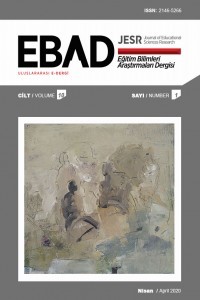Pedagojik formasyon programının öğretmen adaylarının görüşlerine göre değerlendirilmesi (Muğla Sıtkı Koçman Üniversitesi Örneği)
-
Evaluation of pedagogical formation program based on the opinions of pre-service teachers (Muğla Sıtkı Koçman university sample
___
- Akdemir, A. S. (2013). Türkiye’de öğretmen yetiştirme programlarının tarihçesi ve sorunları. Turkish Studies, 8 (12), 15-28.
- Akyüz, Y. (2006). Türk eğitim tarihi: M.Ö. 1000–M.S. 2006. Ankara: Pegem Yayıncılık.
- Altınkurt, Y., Yılmaz, K. & Erol, E. (2014). Pedagojik formasyon programı öğrencilerinin öğretmenlik mesleğine yönelik motivasyonları. Trakya Üniversitesi Eğitim Fakültesi Dergisi, 4 (1), 48-62.
- Atav, E. & Sönmez, S. (2013). Öğretmen adaylarının kamu personeli seçme sınavına ilişkin görüşleri. Hacettepe Üniversitesi Eğitim Fakültesi Dergisi. Özel Sayı 1, 1-13.
- Aydoğan, M. (2007). Tonguç’a mektuplarla köy enstitüsü yılları. Ankara: Köy Enstitüsü ve Çağdaş Eğitim Vakfı Yayınları.
- Aysu, B. (2007). Okul öncesi öğretmen adaylarının öğretmenlik mesleğine karşı tutumlarının incelenmesi. (Yayımlanmamış Yüksek Lisans Tezi). Ankara Üniversitesi Fen Bilimleri Enstitüsü, Ankara.
- Büyüköztürk, Ş., Çakmak, E., Akgün, Ö., Karadeniz, Ş. & Demirel, F. (2009). Bilimsel araştırma yöntemleri (4. Baskı). Ankara: Pegem Akademi.
- Eraslan, L. & Çakıcı, D. (2011). Pedagojik formasyon programı öğrencilerinin öğretmenlik mesleğine yönelik tutumları. Kastamonu Eğitim Dergisi, 19 (2), 427-438.
- Hoşgörür, V. & Dündar, H. (2003). İnsan kaynağını geliştirme bakımından pedagojik formasyon kurslarının değerlendirilmesi. MEB EARGED Tamamlanmış Proje, Ankara.
- Karagözoğlu, G. (2008). Türk eğitim siteminde öğretmen yetiştirme çıkmazımız. Çağdaş Eğitim, 349 (1), 37.
- Krueger, R. A. (1994). Focus groups: a practical guide for applied research. London: SAGE. Küçükahmet, L. (1993). Öğretmen yetiştirme (programları ve uygulamaları).Ankara: Gazi Üniversitesi İletişim Fakültesi Matbaası.
- Şimşek, H. (2005). Ortaöğretim alan öğretmenliği tezsiz yüksek lisans programına devam eden öğrencilerin öğretmenlik mesleğine yönelik tutumları. Yüzüncü Yıl Üniversitesi Elektronik Eğitim Fakültesi Dergisi, 2 (1), 1-26.
- Şişman, M. (2006). Eğitim bilimine giriş. Ankara: Pegem A.
- Yıldırım, A. & Şimşek, H. (2011). Sosyal bilimlerde nitel araştırma yöntemleri. Ankara: Seçkin Yayınevi.
- YÖK (2007). Öğretmen yetiştirme ve eğitim fakülteleri (1982–2007). Yükseköğretim Kurulu Yayını 2007–5. Ankara: Meteksan A.Ş.
- Yumuşak, A., Aycan, N., Aycan, Ş., Çelik, F., & Kaynar, H. Ü. (2006). Muğla Üniversitesi tezsiz yüksek lisans programı ile eğitim fakültesi lisans programı öğrencilerinin öğretmenlik mesleğine yönelik tutum ve endişelerinin karşılaştırılması. 15. Ulusal Eğitim Bilimleri Kongresi Bildiri Özetleri, 13-15 September 2006, MSKÜ, Muğla.
- Yüksel, S. (2004). Tezsiz yüksek lisans programının öğrencilerin öğretmenlik mesleğine ilişkin tutumlarına etkisi. Eğitim Fakültesi Dergisi, 17 (2), 355-379.
- Yüksel, S. (2010). Fen-Edebiyat fakültesi öğretim üyelerinin öğretmen yetiştirme sistemine ilişkin düşünceleri (Uludağ üniversitesi fen-edebiyat fakültesi örneği). I. Ulusal Eğitim Programları ve Öğretim Kongresi. Balıkesir Üniversitesi Necatibey Eğitim Fakültesi, 13-15 May 2010, Balıkesir.
- Başlangıç: 2011
- Yayıncı: Kürşad YILMAZ
Sınıf öğretmenlerinin fen derslerinde kavramsal değişim yaklaşımını kullanma düzeyleri
Karmelita PJANIĆ, Edin LIĐAN, Admir KURTANOVIĆ
Beden eğitimi dersi yatkınlık ölçeğinin türkçe uyarlaması: geçerlik ve güvenirlik çalışması
Mustafa Kayıhan ERBAŞ, Hüseyin ÜNLÜ, Yaprak KALEMOĞLU VAROL
Ters-yüz öğrenme: Yanlış anlaşılmalar ve doğrular
Yeliz TEMLİ DURMUŞ, Başak KASA
Necdet AYKAÇ, Hilal BİLGİN, Çetin TORAMAN
Okul yöneticilerinin eğitim liderliği geliştirmede tercih ettikleri eğitim liderliği standartları
